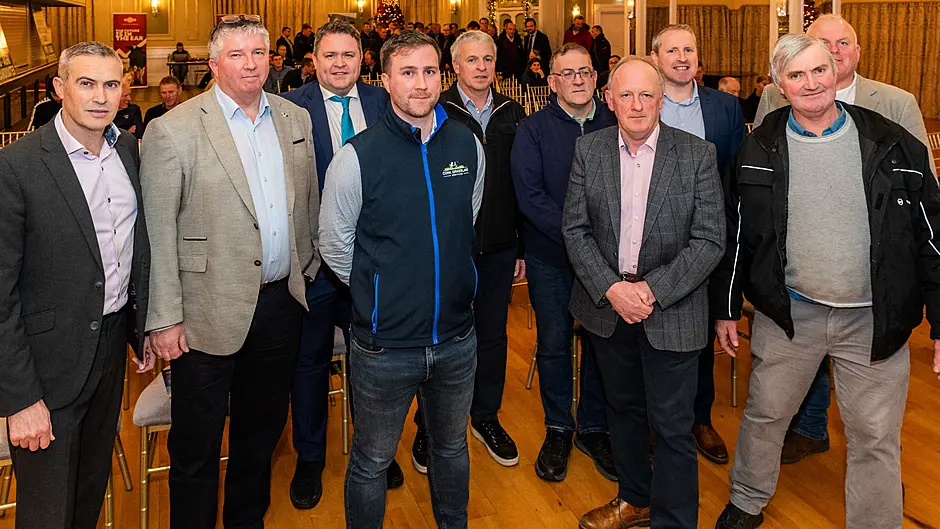FIVE years is the most in terms of certainty that farmers can except for any nitrates action plan – that is the view of IFA Environment chairman John Murphy as farmers called for longer-term certainty around regulations facing the sector.
BY TOMMY MOYLES
Mr Murphy was speaking at Clonakilty IFA’s dairy seminar, Sustainable Dairying in West Cork on Monday night. In his view, a five year plan includes the one-year remaining in the current Nitrates Action Plan (NAP) and four into the next one, if it is agreed.
‘We need to concentrate on improvements, not the targets. If we do that water quality will constantly be improving and it will increase our chances of retaining the nitrates derogation. The one thing for certain is if we improve water quality we will keep the derogation.’
Reducing losses of nitrogen and phosphorus to water was key to this and an increase in manpower in terms of advisers on the ground to help farmers plan and manage their resources better were essential. ‘There’s only one way to do that and that is about managing the nutrients on your farm, whether they are organic or artificial, judiciously. We need to be careful and when we put out nutrients and make sure none go out in the closed season. We need to bring everyone up a small bit. My attitude to this is: if we can hold onto what we have, science and the progression of time will help us dramatically.’
More than 120 people attended the event at Fernhill House Hotel in Clonakilty where topics covered ranged from the cost of doing business to how important dairy is to both Ireland and the local West Cork economy. There was a bit less apprehension in the air compared to this time last year, when different parts of West Cork were being divided into areas where organic nitrogen stocking rates were being limited to either 220kg N/Ha or 250kg N/ha. Saying that, the shadow of derogation cuts was still present.
Carbery’s director of sustainability, Enda Buckley, said that farmers have reacted positively to water quality measures and also Carbery’s sustainability bonus programme, ‘Future Proof’. He said 96% of Carbery’s milk suppliers availed of the first stage of the programme and received €3m worth in return in 2022. A total of €4.7m has been paid out this year with 84% of suppliers taking part. Highlighting a number of elements of the programme, the sustainability manager for the group said that the level of decarbonisation achieved by farmers switching to protected urea reduced by 4,737 tons co2 equivalent. This equated to the same levels of GHG emissions as 846 cows. An even higher reduction in GHG emissions was achieved through a reduction in the use of chemical nitrogen to the tune of 41,309 tons by West Cork farmers from 2022 to 2023 and this is expected to reduce further for this year.
‘There have been 1,202 Agricultural Sustainability Support and Advisory Programme (ASSAP) visits, one for every supplier and 111 applications to the Farming for Water EIP (European Innovation Partnership) applications. This is the highest number of any processor in the country,’ said Mr Buckley.
This EIP is new from the Department of Agriculture and is in partnership with Teagasc and Dairy Industry Ireland, and the Local Authority Waters Programme (LAWPRO). Through it, farmers can access funds to help improve water quality.
Also contributing to the meeting was Director of Dairy Industry Ireland, Conor Mulvihill. He noted we produce five times more milk per head of population here in Ireland than the average in the EU. Compared to our nearest competitors, Netherlands and Denmark, Ireland produces double them in terms of milk produced per head of population. Today, the State’s dairy industry is worth €17.6bn. To put that in context, the whole hospitality sector is worth €13.5bn. ‘Dairy is the biggest native industry and there is no alternative to it. We are a dairy superpower and Cork is the beating heart of that. It’s worth €4.4bn per annum to the county alone.’
Referencing the OPW bike shed debacle at Leinster House, he said what dairy is worth to Cork is the equivalent of 13,500 bike sheds per year. ‘We’re at a crossroads in terms of policy, we have gone through a good 10 weeks but the 18 months before that were an unmitigated disaster.’
Poor milk price, increased input costs and bad weather all contrived to make it a challenging period, he said and after 15 years of growth, milk production was significantly reduced this year. He added that at one point it looked like the volume of milk produced in 2024 was going to be back the equivalent of the milk supply pool of f Aurivo and Arrabawn, two milk processors in the north west of the country. The good weather since late August has seen supplies increase but will still be behind last year’s total production.








